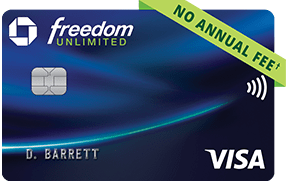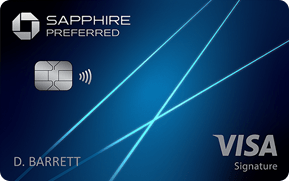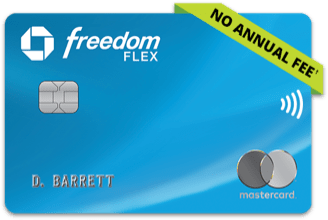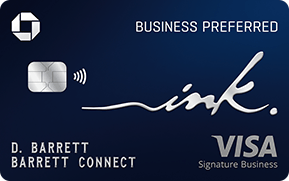The content and opinions provided on this site have not been provided or commissioned by any issuer of the financial products and/or services appearing on this site. The content and opinions have not been reviewed, approved or otherwise endorsed by an issuer. Offers may be subject to change without notice. For more information, please read our full disclaimer.
Chase is a top credit card issuer in the U.S., praised for its wide range of cards and excellent customer service. Whether you're after rewards, cashback, or travel perks, Chase has options to fit your needs.
Selecting the right credit card is crucial as it can significantly impact your financial health and lifestyle. By considering factors such as interest rates, fees, rewards programs, and specific personal spending habits, you can choose a card that not only provides financial benefits but also aligns with your goals and everyday expenses.
Chase® Credit Card Offerings
Chase Bank, officially known as JPMorgan Chase & Co., is one of the largest and most successful financial institutions in the world, with a rich history that dates back over two centuries. Headquartered in New York City, Chase operates thousands of branches and ATMs across the United States, providing a familiar and trusted banking experience for millions of customers.
Competing vigorously with other major banks, Chase has established a significant presence in both the retail and investment banking sectors, reflecting its commitment to innovation and customer satisfaction.
When it comes to credit card offerings, Chase stands out due to its extensive range of products tailored to meet diverse consumer needs. From entry-level cards for those new to credit to premium options with luxury travel benefits, Chase provides a variety of choices that cater to various lifestyles and financial goals.
Key offerings include the Chase Sapphire Preferred and Reserve cards, which are particularly popular among travelers for their robust reward structures and travel perks, as well as cash back cards like the Chase Freedom series, designed to help customers maximize rewards on everyday purchases.
The benefits of having a Chase credit card are considerable. Not only do these cards offer competitive rewards programs, but many also come with additional features such as extended warranty protection, purchase protection, and 24/7 fraud monitoring.
Many Chase credit cards are integrated with popular rewards programs, allowing cardholders to easily use their points for travel, shopping, and more. With a strong focus on customer service and innovative technology tools to manage accounts effectively, having a Chase credit card can greatly enhance one’s financial experience, making it a smart choice for a wide array of consumers.
Chase® Bank Credit Cards
Chase Bank offers an impressive lineup of credit cards, each crafted to suit various financial goals and lifestyles. Below, review the features, benefits, and important considerations for selecting some of their key offerings.
Chase Freedom Unlimited®

- Cash Back
- 1.5%
- Annual Fee
- $0
With Chase, earn 3% back on restaurant and drugstore purchases and 5% on travel purchased through Chase. See website for details.
- Variable APR: 19.99-28.74%
- Low introductory APR
- Rewards never expire
Chase Sapphire Preferred® Card

- Special Offer
- 60K points
- Annual Fee
- $95
The Chase Sapphire Preferred Card is one of the most in-demand travel rewards cards. The card comes with some excellent sign-on bonuses and offers three points on all dining and travel-related purchases.
- Variable APR: 20.99%-27.99%
- Airport lounge access
- Trip cancellation and interruption insurance
Chase Sapphire Reserve®

- Points
- 5X
- Annual Fee
- $550
As a premium offering, the Sapphire Reserve card rewards cardholders with 3x points on travel and dining purchases. It includes added perks such as a significant annual travel credit and complimentary access to airport lounges. See website for details.
- Variable APR: 21.49-28.49%
- $300 annual travel credit
- Receive up to $120 credit for Global Entry or TSA PreCheck
Chase Freedom Flex℠

- Cash Back
- 5%
- Annual Fee
- $0
The Chase Freedom Flex card offers an introductory APR of 0% for 15 months. While the variable APR increases based on your creditworthiness following the initial promotional window, the 15 months does provide a decent timeframe for paying off or down larger purchases. Additionally, the card offers 5% cash back on travel and other purchases up to $1,500.
- Variable APR: 20.49-29.24%
- Fraud monitoring
- Rewards do not expire
Ink Business Preferred® Credit Card

- Rewards
- 3X points
- Annual Fee
- $95
Specifically tailored for business owners, this card allows you to earn a robust amount of points on business-related expenses, making it ideal for entrepreneurs. See website for details.
- Variable APR: 20.24-26.24%
- Account alerts
- Rewards never expire
Most Popular Features and Benefits of Chase Credit Cards
Chase credit cards are known for their robust rewards programs and additional perks that cater to a wide array of consumer preferences. A key feature across many of their offerings is the rewards program, which typically includes options for earning points, cash back, or travel rewards.
With cards like the Chase Sapphire Preferred® and Chase Sapphire Reserve®, cardholders can accumulate points that can be redeemed for travel expenses, dining, and more, providing significant value for those who frequently spend in these categories.
Alternatively, cards such as the Chase Freedom Unlimited® focus on cash back, allowing users to earn a streamlined 1.5% cash back on every purchase, making it exceptionally straightforward to accumulate rewards.
In addition to their rewards structures, Chase credit cards come with a suite of valuable perks designed to enhance the cardholder experience. Many of these cards offer travel insurance, including trip cancellation and interruption protection, which provides peace of mind for those who travel often.
Other benefits may include purchase protection, which covers new purchases against theft or damage for a limited time, as well as extended warranty protection that extends manufacturers' warranties on eligible items. These features not only alleviate financial risks but also contribute to a more secure and enjoyable spending experience, making Chase credit cards a popular choice for diverse lifestyles.
Chase® Credit Cards vs Competitors
When evaluating Chase credit cards against those offered by competitors, several key factors should be taken into account to ensure a well-informed decision:
- Interest Rates and APRs: Chase credit cards generally offer competitive interest rates; however, it’s essential to compare these rates with those of other issuers. An introductory 0% APR on purchases or balance transfers can be a significant advantage, especially for cardholders who plan to make larger purchases or transfer existing balances to manage their debt more effectively.
- Annual Fees and Associated Costs: While many Chase cards, such as the Freedom series, come with no annual fee, others like the Sapphire Reserve do impose a premium fee. It is critical to weigh these costs against the rewards and benefits offered. For instance, a high annual fee may be justified through luxurious travel perks or significant rewards if the cardholder frequently travels.
- Eligibility Requirements and Credit Score Considerations: Chase cards typically require good to excellent credit scores for approval, which may be a higher threshold than some competitors. It is advisable for potential applicants to check their credit score and ensure it meets the minimum requirements before applying. Factors such as income and existing credit utilization can influence eligibility.
- Compatibility with Personal Spending Habits and Financial Goals: The effectiveness of any credit card ultimately hinges on how well it aligns with the cardholder’s spending habits. For individuals who spend significantly on travel and dining, the rewards structure of the Sapphire Preferred or Reserve may offer greater value. Conversely, those who prioritize consistency and simplicity might prefer cash-back options like the Freedom Unlimited. Assessing one’s financial goals—whether saving for a major purchase, maximizing travel rewards, or maintaining a budget—will guide the choice of the most suitable Chase card or its rivals.
Tips for Selecting the Right Chase® Card
Choosing the right Chase credit card can significantly impact your financial health and reward potential. Here are some expert tips to guide your selection process:
- Assess Personal Financial Needs and Lifestyle: Begin by evaluating your spending patterns and financial objectives. Do you frequently travel, dine out, or make large purchases? Understanding your spending habits will help you identify which card aligns with your lifestyle. For instance, if travel is a priority, options like the Chase Sapphire Preferred® could be beneficial, while those who prefer straightforward cash back might opt for the Freedom Unlimited®.
- Compare Rewards Programs and Benefits: Take the time to explore the various rewards programs available across Chase’s offerings. Each card has distinctive features tailored to different consumer preferences. Look beyond just the points earned; consider the redemption options available and the additional perks that come with each card, such as travel insurance, purchase protection, and fee waivers.
- Consider Long-Term Value Over Short-Term Perks: While introductory offers may look appealing, it’s essential to think about the card’s value over the long term. Assess how the card fits into your financial plans and whether the ongoing rewards and benefits outweigh the costs, such as annual fees. A card that offers consistent value and aligns with your spending habits will often serve you better than one with impressive short-term incentives.
Selecting the right credit card is a critical component of effective financial management and maximizing reward potential. Your credit card should not only accommodate your current spending habits but also align with your long-term financial goals.
Applying for a Chase® Credit Card
When you decide to apply for a Chase credit card, it's essential to start the process with a clear understanding of what to expect. First, ensure that you meet the eligibility criteria, which typically includes having a good to excellent credit score. Before submitting your application, take the time to review your credit report for any inaccuracies and assess your current financial standing, as this can help you make a stronger case for approval.
Once you're ready to apply, you can do so online through Chase’s website, where each card's specific requirements and benefits are outlined. The application process usually involves providing personal information, including your income, employment status, and housing arrangements. It’s advisable to be honest about your financial situation, as discrepancies can lead to denial.
After you submit your application, Chase will conduct a credit check, and you may receive a decision almost immediately. In some cases, further verification might be required, which could slightly delay the process. If approved, you’ll receive your card in the mail along with a detailed explanation of your credit line, terms, and any introductory offers you may qualify for. Remember to read the fine print carefully, as understanding the terms of service can help you utilize your new card effectively and avoid any pitfalls.
As discussed, factors such as rewards structures, fees, and personal eligibility play significant roles in determining which card can provide the most value to you. A well-chosen card can offer not only offer rewards but also peace of mind through additional perks like travel insurance and purchase protection, enhancing your overall spending experience.
As you look into this important decision, don’t neglect to do research and give your decision thorough consideration. With so many options available, take the time to compare card offerings and evaluate how each aligns with your financial lifestyle. Looking into the specifics of each card will help you to make an informed choice that suits your needs and position you for success in your financial journey.








